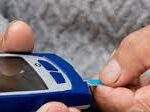Diagnostic tests commonly employed in the evaluation of diabetes include:
1. Glycated Hemoglobin (A1C) Test: This blood test assesses the average blood sugar level over the past 2 to 3 months. It measures the quantity of blood sugar bound to the oxygen-carrying protein found in red blood cells (hemoglobin). Elevated blood sugar levels result in higher hemoglobin sugar attachment. A confirmed A1C level of 6.5% or above on two separate tests indicates diabetes.
In cases where the A1C test is unavailable or if certain conditions might affect its accuracy, such as pregnancy or the presence of an uncommon hemoglobin variant, the following alternative tests might be employed:
2. Random Blood Sugar Test: A blood sample is collected at a random time and may be followed by additional tests to confirm the results. Blood sugar values are reported in milligrams per deciliter (mg/dL) or millimoles per liter (mmol/L). Regardless of the time since your last meal, a random blood sugar level equal to or exceeding 200 mg/dL (11.1 mmol/L) suggests diabetes.
3. Fasting Blood Sugar Test: A blood sample is obtained after an overnight fasting period. A fasting blood sugar level below 100 mg/dL (5.6 mmol/L) is considered normal. A fasting blood sugar level ranging from 100 to 125 mg/dL (5.6 to 6.9 mmol/L) is indicative of prediabetes. If the result is 126 mg/dL (7 mmol/L) or higher on two separate tests, diabetes is diagnosed.
In the event of a diabetes diagnosis, your healthcare provider may perform additional blood tests. These tests help identify autoantibodies commonly found in type 1 diabetes, aiding in distinguishing between type 1 and type 2 diabetes when the diagnosis is uncertain. The presence of ketones, which are byproducts of fat breakdown, in the urine suggests type 1 diabetes rather than type 2.
Following the diagnosis, regular visits to your healthcare provider are essential for diabetes management. During these visits, the provider will monitor your A1C levels. The target A1C goal may vary depending on factors such as age and individual circumstances. Generally, the American Diabetes Association recommends maintaining A1C levels below 7%, corresponding to an average glucose level of approximately 154 mg/dL (8.5 mmol/L).
A1C testing provides a better assessment of the effectiveness of diabetes treatment plans compared to daily blood sugar tests. Elevated A1C levels may necessitate adjustments in insulin dosage, meal plans, or both.
In addition, your provider will collect blood and urine samples to evaluate cholesterol levels and assess the functioning of the thyroid, liver, and kidneys. Blood pressure measurement and inspection of the sites where blood sugar testing and insulin administration occur are also part of the routine examination.
Dr. Mangaiyarkkarasi Sivakumar, an Endocrinology specialist, offers diabetes treatment to residents in Kendall Park, Monmouth Junction, Helmetta, East Brunswick, Monroe Township, South Brunswick Township, Dayton, New Jersey.
VCare Diabetes Care in Dayton,NJ Book an Appointment / Call (888) 460 1151 / Walk-Ins also available


